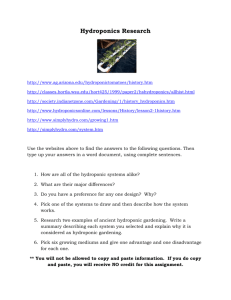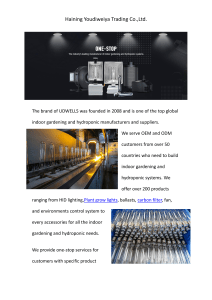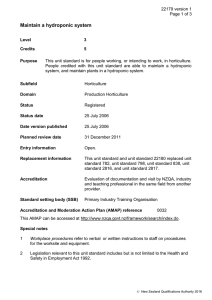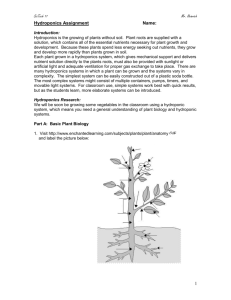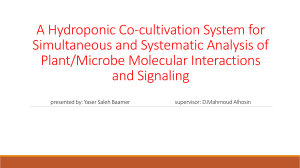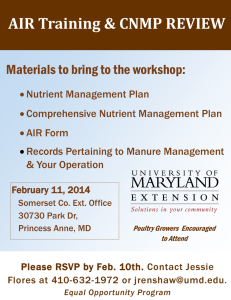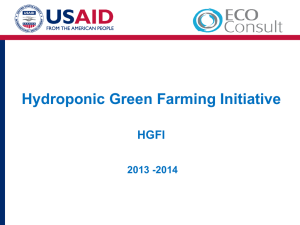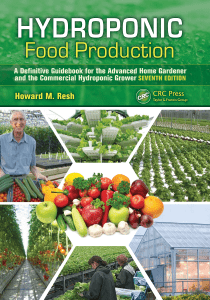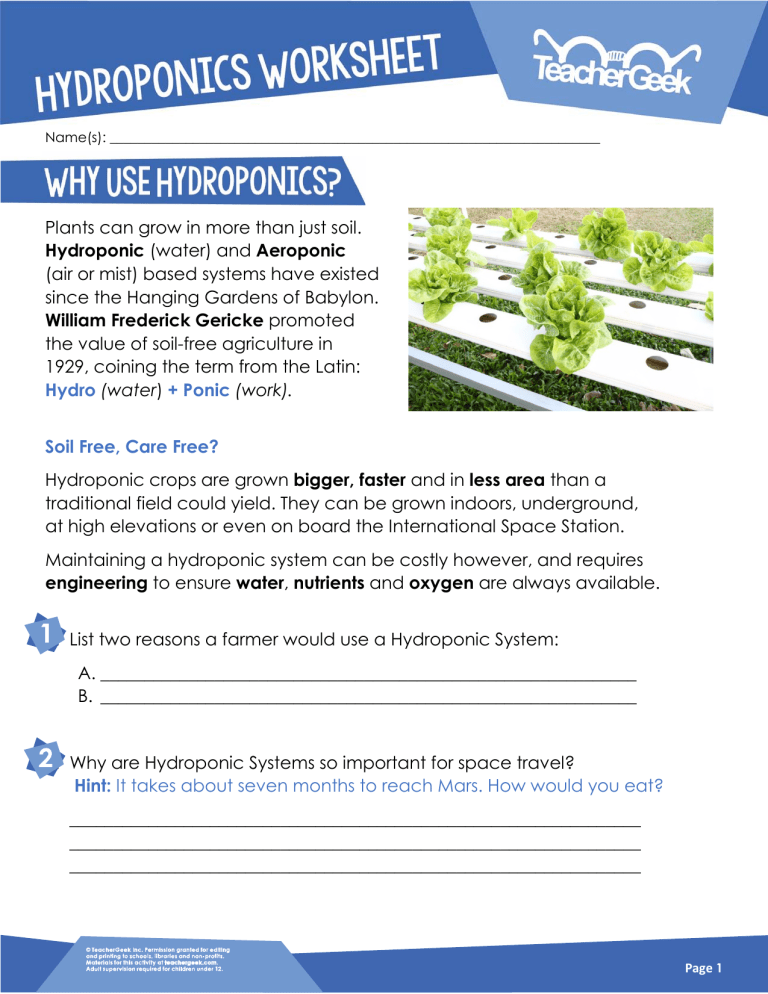
Name(s): _______________________________________________________________________ Plants can grow in more than just soil. Hydroponic (water) and Aeroponic (air or mist) based systems have existed since the Hanging Gardens of Babylon. William Frederick Gericke promoted the value of soil-free agriculture in 1929, coining the term from the Latin: Hydro (water) + Ponic (work). Soil Free, Care Free? Hydroponic crops are grown bigger, faster and in less area than a traditional field could yield. They can be grown indoors, underground, at high elevations or even on board the International Space Station. Maintaining a hydroponic system can be costly however, and requires engineering to ensure water, nutrients and oxygen are always available. 1. List two reasons a farmer would use a Hydroponic System: A. _____________________________________________________________ B. _____________________________________________________________ 2. Why are Hydroponic Systems so important for space travel? Hint: It takes about seven months to reach Mars. How would you eat? _________________________________________________________________ _________________________________________________________________ _________________________________________________________________ Page 1 Light Carbon Dioxide Oxygen Water Nutrients Macronutrients: Nitrogen, Phosphorus and Potassium. Plants absorb more of these than any other nutrient. Micronutrients: Plants require less of these, including: boron, calcium, copper, iron, magnesium, and zinc. Photosynthesis: the process used by plants to convert “light energy” into “chemical energy”. This light energy, often from the sun, is stored in carbohydrates and sugars synthesized (combined) from Carbon Dioxide and Water. Then, Oxygen is released as waste. You enjoy the products of photosynthesis in food and in the air we breath! D A 3. Match the components of the photosynthesis process below: Light Energy: B Water H2O: C Oxygen O2: Carbon Dioxide Co2: Page 2 Light Growing Media Plants grown in Hydroponic Systems need only light, water, nutrients, and a growing medium (such as rockwool, coconut fiber, old wool socks or perlite). Socks Rockwool Cotton Towel Complete the following sentences: Words may only be used once. Water Nutrients Growing Medium Light Water Photosynthesis Carbon Dioxide Chemical Sugars Oxygen Proteins Soil 4. Hydroponic Systems use __________ for growing plants in place of _________. 5. Plants convert _________ energy from sunlight into _________ energy, which is stored in carbohydrates and ___________ for future use. This process of __________________ produces ____________ as a waste product. 6. Hydroponic Systems use a ____________________ like rockwool or perlite. Page 3 Drip Systems are the most used hydroponic system in the world. An automated system uses a timer and pump to drip nutrient solution through a small tube into the base of the plant’s growing medium. Recovery Drip System: excess nutrient solution run-off is collected for re-use. Non-Recovery System: excess nutrient solution run-off is not collected. 7. Why does your Micro Hydroponic Drip System not need an automated pump to work? Hint: What force causes mass to fall? _______________________________________________ _______________________________________________ Nutrient Solution Tubing Drip 8. Discuss and compare the environmental impact of (A) Recovery and (B) Non-Recovery Drip Systems? A ____________________________________________ ____________________________________________ ____________________________________________ B ____________________________________________ ____________________________________________ ____________________________________________ Acid Rain: rainfall made acidic (a pH less than 7) due to pollution in the earth’s atmosphere from the burning of fossil fuels like coal. Growing Medium Rockwool Recovery Drip System Portion Cup Page 4 Flood and Drain Systems (also known as Ebb & Flow, or Dutch Buckets) work by temporarily flooding the plant’s grow tray with nutrient solution, then draining the solution back into the reservoir. This is normally done with a submerged pump on a timer, and works well with gravel or rockwool. Growing Medium Reservoir Rockwool Adjusted Cylinder Nutrient Solution How can you adjust your cylinders to add and remove water throughout the day? Tubing Drip Flood In most Flood & Drain systems, the reservoir is lower than the hydroponic system, allowing nutrient solution to drain, recovered then through gravity. Drain 9. Ancient agriculture used the flooding of rivers such as the Tigris or Nile to create a fertile silt (nutrient solution) for crops. Why was the engineering of dams to control and drain this water so important? _____________________________________________________________________ _____________________________________________________________________ _____________________________________________________________________ Page 5 Wick System: A wick is used to draw the nutrient solution from a reservoir-fed dish, up into the growing medium (perlite, vermiculite or coconut fiber). Deep Water Culture (DWC): The simplest active system. The plants float directly on the nutrient solution, as an air pump supplies oxygen to the roots. Best for lettuce. How could you add an air pump to your own hydroponic system? Nutrient Film Technique (NFT): The nutrient solution (film) is pumped into the angled tray (through a tube) and recirculates over the dangling roots, draining back into the reservoir. The constant flow of film requires no growing medium other than air. Plants are often sensitive to interruptions in flow cycles. Aeroponic Systems: The most high-tech system. Like the N.F.T. system, the growing medium is primarily air. The roots dangle, misted with timed nutrient solution every few minutes. They will dry out rapidly if the mist cycles are ever interrupted. 7. Name a disadvantage of relying on an automated hydroponic system? ___________________________________________________________________________ ___________________________________________________________________________ Page 6 Would you live on Mars? Questions like these were once the realm of science fiction; no longer! Space travel is possible, yet constraints persist. How would we grow food in zero-gravity? The Unique Challenges of Growing Food in Space • • • • Zero-Gravity Soil-Free Artificial Light Source Limited Surface Area 15. Plants need surface area to expand their root systems and grow. How can hydroponic systems adapt to limited surface area? Hint: Think of your cylinders. Are they vertical? Horizontal? ________________________________________________________________ ________________________________________________________________ ________________________________________________________________ ________________________________________________________________ 16. Without soil, plants aren’t limited by which direction they grow. This is a huge advantage in weightlessness. Briefly describe which type of hydroponic system you believe would work best in the small quarters of the International Space Station? The dark terrain of Mars? ________________________________________________________________ ________________________________________________________________ ________________________________________________________________ ________________________________________________________________ Page 7 “Lacking soil, you need some sort of substrate... I considered using an old shirt or sock but decided the Russian supplied toilet paper was best…It consisted of two layers of coarsely woven gauze. It [made] a wonderful sprouter,… [retained] water well and the seeds can be anchored under the gauze weft...” – ISS Science Officer Don Pettit, November 2002 Ideal Space Plants Would Be: • • • • Short Grow quickly in low light Have few inedible parts Resist disease • • • • Need little water Need few nutrients Low maintenance Yield plenty of oxygen 20. Would the seeds used in your Hydroponic System be ideal space plants? Why or why not? _____________________________________________________ _____________________________________________________________________ _____________________________________________________________________ _____________________________________________________________________ _____________________________________________________________________ Don Pettit’s Space Zucchini Page 8 Greenhouse: an enclosed glass or transparent building for gardening, allowing in sunlight, while also trapping heat inside. Light Energy Recycling With Purpose Greenhouses are built out of all sorts of things. Plastic soda bottles make great materials to trap heat. Greenhouse Effect: The earth’s atmosphere acts like a giant greenhouse. Greenhouse Gases (water vapor, carbon dioxide, methane, ozone) absorb and trap heat, preventing the planet from freezing. Earth needs a careful balance – too many greenhouse gases could make the climate too hot (due to pollution, deforestation and the burning of fossil fuels). Page 9 Independent Variable: The thing you change in the experiment, to test how it affects the DV. There should only be one IV for each experiment. Dependent Variable: the thing being tested and measured as a result of the IV. There should only be one DV for each experiment. Control: Things that should not change in an experiment. There can be many controls for each experiment. What variables can you change in your Micro Hydroponic System? (e.g. Light, Growing Medium) ____________________________________ ____________________________________ ____________________________________ ____________________________________ What things may change as a result of these Independent Variables? (e.g. Height, Plant Color) ____________________________________ ____________________________________ ____________________________________ ____________________________________ What things would be controls in your Micro Hydroponic System? (e.g. Type of Seed Planted) ____________________________________ ____________________________________ ____________________________________ Page 10
